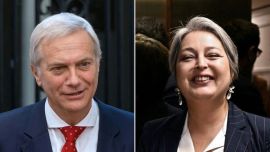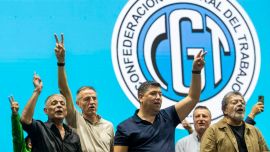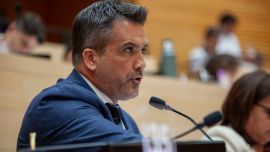Jailed businessman Lázaro Báez, a central figure in several corruption scandals involving the Kirchner governments and members of the presidential couple’s family, has been granted house arrest, sparking an angry reaction from opposition lawmakers, supporters – and his likely future neighbours.
A ruling ordering his release was issued on Wednesday by Tribunal Oral Federal 4 (TOF4) court, in compliance with a previous decision from the Federal Criminal Cassation Court.
Báez, 63, remains in Ezeiza Prison for now, however, as his lawyers seek to lower his bail. The businessman, who for years was a key figure in a number of public works projects in Santa Cruz province, was told to post a bond of 632.5 million pesos (US$8.9 million) prior to his release. He will also be required to wear an electronic anklet, though he will be permitted to move within 100 kilometres of his intended residence in the Ayres de Pilar gated community.
Báez, however, may have to find a new home. His future neighbours held a number of cacerolazo protests on Wednesday, Thursday and yesterday, requesting that he not take up residence there.
According to reports yesterday, Báez is unlikely to be released until next week at the earliest, with a response from the courts on the bail set unlikely to arrive before Monday. Prosecutors had originally proposed bail be set at US$5.5 million, Infobae reported.
On Friday, the Financial Information Unit (UIF) said it supported the decision to order his release. "With regard to preventive detention, our criteria is homogeneous, without distinction of names: the loss of liberty without a final sentence is only justified in cases of procedural danger, flight [from justice] or obstruction of the investigation," a spokesperson told the Noticias Argentinas news agency.
Báez and the Kirchners
Báez has been in jail since 2016 when he was arrested for being a main player in the “K-money route” case, in which he allegedly helped launder more than US$60 million. The businessman has several open cases against him, but he has been remanded in custody specifically via the ‘M&P case,’ a branch-off from the main investigation.
The M&P case which was brought to trial by judge Sebastián Casanello in 2019, investigates Báez and his children for injecting government money through a shell company, M&P, into their main enterprise, Austral Construction.
In another case for which Báez has already been put on house arrest, he was accused of using US$14 million of dirty money to buy the “El Entrevero” estate in Uruguay.
Several of these cases have been linked by prosecutors to the Kirchners, though Vice-President Cristina Fernández de Kirchner denies any connection to Báez’s alleged illegal activity.
From 2005 to 2015, his Austral Construcciones firm won 51 tenders worth more than 46 billion pesos, according to investigators.
Appeals and release
Báez has appealed for house arrest on multiple occasions during his four-year spell in jail, most recently on June 19, but though requests have been rejected up until now. His lawyers have appealed last month’s rejection, arguing it is excessive to deny him the opportunity for house arrest given that he does not have a confirmed sentence against him and has already been behind bars for an extended period.
Additionally, his defence team cited health concerns including coronary heart disease, respiratory failure and type 2 diabetes, all of which put their client in the Covid-19 high risk group.
Báez’s legal team have been arguing that his 2016 arrest is illegal since it took place. His lawyer, Elizabeth Gasaro has said that he is being “psychologically tortured” in the hope he will become a whistleblower and implicate members of the Kirchner family.
Gasaro said this week that “many things that have been argued by the defence are now being verified in the case of illegal espionage,” a reference to judicial investigations probing the activities of the AFI intelligence agency during the Mauricio Macri administration’s 2015 to 2019 time in office.
Báez’s representatives say the results of the illegal espionage case could reveal “serious violations of human rights” have been committed against their client.
Gasaro welcomed the court’s ruling, despite criticism from the opposition. “I am very happy about this ruling after four years and four months of fighting against an illegal arrest, which we have been arguing since day one,” she said.
Báez is the latest in a string of high-profile Kirchnerite figures accused of corruption who have been released from jail since Macri lost last year’s election to President Alberto Fernández. The list includes individuals such as businessmen Cristobal López and Fabián de Sousa, ex-federal planning minister Julio De Vido, ex-federal planning secretary Roberto Baratta and former vice-president Amado Boudou.
– PERFIL/TIMES
























Comments